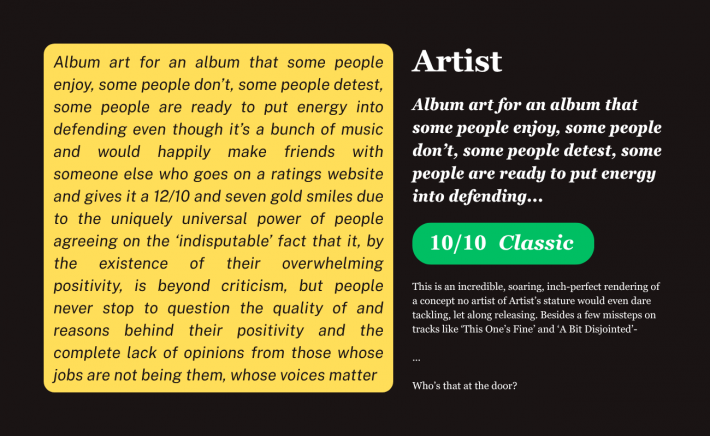

Interesting discussions have been happening lately about music critics and forms music criticism have taken over the years, adapting not only to what’s in the zeitgeist at a certain time but also the general interests of its consumers. In 2025, most music commentary tends to lean one of two ways; either a contrived, extreme point of view that’s at times more an ear-jerk reaction than an opinion, or saying a lot of nothing. But this is set to change, and in our indie scene, it’s important that it does.
A common talking point (also used in the excellent New York Times article that brought it into focus recently) is ‘poptimism’, a school of thought that considers pop music equally deserving of being taken seriously as other ‘real’ genres (when the term started being used, it was in answer to rock and ‘rockism’), which is still relevant, of course; some back-in-the-day-ers are as insufferable as ever. However, today’s prevailing opinions say that music criticism is in itself (a) largely pointless, (b) bought out by the machinery of popular media, or (c) plain wrong. While these ring true to an extent, we’re ignoring the fact that the role of the music critic and the reviewer is more nuanced now, and the reasons for it existing can’t be looked at in context of the past.
The critic’s main role was to talk about and sometimes pass casual judgment on an artist, song, album, whatever. This was when, by today’s standards, there wasn’t much music available to the average listener at all. Young music fans would ask their parents or siblings for enough money (or save up) to buy one, maybe two tapes/records/CDs at a time. Then, well, they’d have to find out ‘what was good’ if they didn’t have a clear idea of what to get. So, they’d ask around, and general opinions often came from young adults who would often read, while being part of their own community having its own tastes. So, the music writer was a ‘driver of opinion’ that entertained while retaining legitimacy in the form of giving advice to people regarding what they might spend their money on. There were points systems, magazines, and a variety of voices commenting on culture as well as music. Some of it was scathing.
Today, the publication/channel, save a few, is... not dead, but in a coma. Many media companies in music have long since concluded that substantive, effort-intensive journalism doesn’t generate enough clicks to help them stay above water. So, quick and vacuous content that states information or re-reports ‘news’ is the norm, and why not? It gets numbers, revenue, and helps direct people to whatever else they do that’s actually profitable. So, when a huge artist releases something, the writer doesn’t care about the listener wanting a unique opinion because that’s not their audience. The listener doesn’t need to know what to spend their money on because music is almost free. They don’t need to know what to spend their time on (advice a critic would also provide through their coverage) because an algorithm will tell them, and if they don’t like the first twenty seconds, they can skip. So, the main thing today’s publications end up doing is reinforce opinions fans already have. You’ll always find rage-bait or ‘validation’ of your superfan-ness depending on which side of an artist’s fence you fall on, and not much else.
Obviously, vilifying music media, while a popular and understandable sentiment, is not the whole story. Fans have been, well, ‘intense’ about their favourite music getting not-glowing praise for decades. Involving this aspect means largely alienating the main consumer base for most outlets, so it isn’t brought up as much as it should be. Music journalists have received their fair share of hate over the years, but the pop-internet age made it nasty; doxxing, death threats et al. Some people tie their identities and emotional cores to artists they barely know, and whether by the industry’s design or not, it’s a hostile environment for anything besides conversation that sounds more like worship than debate. Fanbases are often aggressively positive, treating anything beneath reverence as a direct attack on the joy and sense of community they found in the music they love. For example, you can find this surrounding many a pop and K-pop artist/group (for legal reasons, K-pop refers to ‘Karnataka Pop’, a genre popularised in southern India last decade by inebriated college students; here’s one of its foundational masterpieces.) Add in labels or PR paying for good reviews, and things look hopeless. But hold that thought.
The potential ‘revival of the review’ seems to consist of two parts. The first is that some listeners are slowly starting to tire of the relentless onslaught of music hurled at them every single day. This seems to be bringing back the need for honest criticism, and they definitely aren’t finding it online just yet (again, besides a few exceptions). So, publications/channels will have to put effort into this aspect of their work if their consumers grow increasingly disgruntled with ingesting pre-digested word paste. The second depends on content creators in music criticism realising that their role depends greatly on what they cover, and where they cover it.
India is a great example. We have an indie scene that’s, compared to the wider world, still in its infancy. It entered the public eye only a few decades ago, and really so in the last two. You can see it; headliners at big events in places like Japan, China, Korea, Europe or North America are from their regions. Here, Indian acts are the poster’s second row at best. So, yes, while there are astronomically popular artists who are in the ears of millions whether their latest song is brilliant or the musical equivalent of styrofoam, there is also a growing community that needs to be supported and spoken about. This needs a measure of empathy and understanding while being covered with integrity, and that’s important.
This means that the work of the critic in ‘our space’ is no longer just x/10s, ‘another crowning achievement’s, and 100-word captions. To be clear, all of that stuff is still the norm and will continue to be what makes money and drives engagement for the present. But that’s not all anymore. Now, the critic must be decisive about calling music out for lack of effort, innovation, or misguided intentions. To do that, they must know what they’re talking about, which means that an opinion must have a ‘why’ behind it. This needs things like explaining the history behind a sound or movement. Research. Musical context. Understanding that current music is usually of its current environment, and therefore exploring the current state of the scene and its constituent parts. Now, the critic, when paying music, an artist or an experience the highest possible compliment, must also know what they’re talking about, because while big fanbases will continue to lap up praise all the same, the concept of ‘trust’ has a real chance of making a quiet entrance back into the world of music discourse.
Most importantly, the idea of being ‘mean’ (which has moving goalposts) for the sake of entertainment might no longer have a place in the world of music journalism. Remember those few exceptions mentioned above? Those outliers who are still surviving? They’ve been doing this since the very beginning on some level, and while changing with the times in terms of the type of content they make to get their points across, have not changed their core values. More than ever before, just putting out content that is just information or ‘news’ or a description of a piece of music that reads like the information at a museum exhibit is not enough. People must hear what those who are outside echo chambers think – whether those chambers are filled with people agreeing with each other that a thing is the greatest thing since sliced bread or agreeing that a thing is evil incarnate (or just mid.) So, the path forward is not necessarily going to be defined by the idea that music criticism is scathing again, or scoring in general gets lower again, or that consumers will suddenly start paying attention to it again. It will be defined by the idea that music criticism is human again, music critics are people using their experience and knowledge, and the intention behind telling people about music is more considered than just a rating on a screen.
Or none of this will happen and people will continue not to care one bit about anything besides what the money machine and the algorithm tells them. That’s always possible, and we’ll end on that sunny, ever-hopeful note, as is appropriate for these times. Just kidding.
Previous Article Artists Leaving Spotify: Can Indian Indie Afford To Care? Artists Leaving Spotify: Can Indian Indie Afford To Care?
|
Next Article A Conversation With Steven Wilson A Conversation With Steven Wilson
|
Or rather, should Indian indie care?
She’s doing interesting things.
The now legendary rock band is playing one show this Friday




-min_square.jpg)
Leave a comment